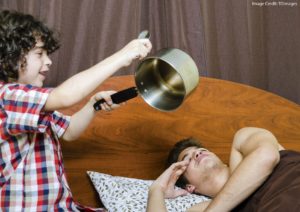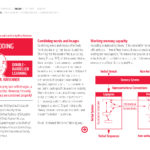My cat and I enjoy blogging about sleep, for the obvious reason that sleep is delicious.
And, of course, essential for learning.
Most often, I’ve written about the importance of high school start times. Occasionally, I write about naps as well. For instance, a recent study in Brazil found that in-school naps promoted learning. (My cat was pleased, but not surprised.)
I’ve come across two studies recently that help us think about sleep (and its relatives) in new ways.
Study #1: Memory Benefits of “Brief Wakeful Resting”
We’ve got lots of research showing that naps promote learning. Heck: even a 6-minute nap enhances subsequent learning. (Not joking.)
Let’s push the envelope on this question. If a six minute nap helps learners remember, perhaps actual sleep isn’t essential. Perhaps a period of mental down time might do the job.
For instance: maybe a ten minute period of “brief wakeful resting” might be enough to promote better learning.
Sure enough, in this study, participants remembered a story better if they “reste[ed] quietly with their eyes closed in the darkened testing room for ten minutes” than if they engaged in active cognitive task.
In fact, they remembered the story better a week later. In other words: this benefit wasn’t merely temporary, but lasting.
The teaching implications here are intriguing.
Should we build in brief intervals of “wakeful rest” after complex lessons? Should we redesign school schedules to allow such breaks?
At present, we don’t really know–because this research was conducted with 70-year-olds. Now, I have nothing against 70-year-olds. Some of my best parents have been in their 70s. But, few of us teach 70-year-olds.
So, I hope that this research will be tried with younger learners. Perhaps we might find a whole new way to organize the school day.
Study #2: The Best Way to Sleep Too Little
You read that right. Is there a better way to get insufficient sleep?
Of course, we know that adolescents simply don’t sleep enough. (Did I mention high-school start times?)
We’ve got lots of research showing that they benefit from more sleep. For instance, we know that they learn more if they get afternoon naps.
But: what if we could keep the total amount of sleep constant, and change the sleep schedule? Is there a better way to get too little sleep?
Researchers tested this question in Singapore. They had one group of adolescents get 6.5 hours of night-time sleep during the week, and 9 hours of sleep over the weekend.
In other words: like many teens, they’re just not sleeping enough on school nights.
Researchers had a second group of students sleep 5 hours at night and take a 1.5 hour nap during the day.
That is: they also got 6.5 hours of sleep–but that total amount of sleep was divided into night-time sleep and a nap.
Did that make a difference?
Results, and Implications
Sure enough, the group that slept 5 hours at night and 1.5 hours during the day showed superior cognitive function, compared to the group that slept 6.5 hours straight through at night.
More specifically, they did better on visual learning tasks, and on factual learning tasks.
In other words: they had a less-than-optimal amount of sleep. But, they had a better schedule for their less-than-optimal-sleep.
What are the implications?
My own view is: this study gives us reason to believe that afternoon naps will benefit adolescents.
Either teens will get more sleep–which will benefit them.
Or, even if they foolishly sleep less at night knowing they can nap during the day, this split-sleep schedule will still help them learn.
That’s as close to “win/win” as we get with teenagers and sleep.
So, what’s next?
In my experience, most teens currently use afternoons to practice their extra-curriculars: sports, or theater, or debate. That is: if we encourage them to do more afternoon napping, we necessarily leave them less time to do these other things.
For this reason, I hope that soon we’ll see research comparing students who nap to students who exercise.
Information about those bigger-picture trade-offs could give schools, teachers, and parents helpful–and practical–guidance.





Great information about sleep. Every person needs sufficient sleep for a healthy life.